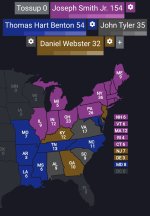1837 - 1840: Senator Hugh L. White (Whig)
1836 (with John Tyler) def. Vice Pres. Martin Van Buren (Democratic), Fmr. Minister William H. Harrison (Whig), Senator Daniel Webster, Senator Willie P. Mangum (Whig)
1840 - 1844: Vice Pres. John Tyler (Whig)
1844 - 1845: Pres. John Tyler (Independent)
1840 (with John Davis) def. Senator Richard M. Johnson (Democratic), Fmr. Mayor James Birney (Liberty), various state Democratic parties
1845 - 1851: Mayor Joseph Smith (Reform) (with Liberty support)
1844 (wih Solomon Copeland) def. Thomas Hart Benton (Democratic), Pres. John Tyler (Democratic-Republican), Sen. Daniel Webster (Whig) [Replacing Henry Clay]
• 1845, start of the First American Civil War
1848 (with Solomon Copeland) def. Senator Henry Clay Jr. (Whig), Senator James Buchanan (Democratic)
1851 - 1853: Vice Pres. Solomon Copeland (Reform)
1853 - 1857: Secretary Thomas L. Kane (Reform)
1852 (with Sam Houston) def. Speaker Nathaniel P. Banks (Liberal) (with Whig Support), Senator Henry C. Murphy (Union & Democracy), Fmr. Rep. Joseph Lane (Democratic), Rep. Sidney Rigdon (Independent Reform)
1857 - 1863: Ret. General Winfield Scott (Independent) (with Liberal, Union and Democracy, and Whig support)
1856 (with Horace Greeley) def. Pres. Thomas L. Kane (Reform), Fmr. Confederate Pres. Lilburn Boggs (Democratic), various Democratic electors
1860 (with Horace Greeley) def. Fmr. Vice Pres. Sam Houston (Reform)
1863 - 1864: Vice Pres. Horace Greeley (Liberal)
1864 - 1873: Pres. Horace Greeley (Republican)
1864 (with Benjamin F. Butler) def. Gov. John M. Bernhisel (Reform), Gov. J. Sterling Morton (Union & Democracy), Fmr. Speaker Nathaniel P. Banks (Liberal)
1868 (with T.A.R. Nelson) def. Senator John M. Bernhisel (Reform), Gov. Wade Hampton III (Union & Democracy)
1873 - 1881: Apostle Joseph F. Smith Sr. (Reform)
1872 (Evander M. Law) def. Vice Pres T.A.R. Nelson (Republican), Fmr. Vice Pres. Benjamin Butler (Ind. Republican)
1876 (Evander M. Law) def. Senator Thomas Tipton (Republican), Rep. Hiram Revels (Black Farmers' Association)
1881 - 1885: Senator Lyman Trumbull (Republican)
1880 (with Isham G. Harris) def. Rep. Hendrick B. Wright (Reform), Gov. D. Wyatt Aiken (The Grange)
1885 - 18XX: Gov. D. Wyatt Aiken (The Grange)
1884 (with A. Montgomery Ward) def. Trade Unionist Uriah Smith Stephens ("Knights of Labor" Reform), Fmr. Gov. Joseph Smith III ("Straight" Reform), Pres. Lyman Trumbull (Republican), Senator Tom Watson ("Southern" Reform), Fmr. Vice Pres. Benjamin F. Butler (Independent - Grand Army of the Republic)
1921 - XXXX: Gov. Franklin M. Smith (Reform)
Whig: d7a652
Democratic: 5283D7
Reform: 67a970
Liberty: c372b9
Democratic-Republican: c37d55
Union and Democracy: c09030
Liberal: 626bfc
Ind. Reform: 9fc9a5
Republican: E2AD49
Ind. Republican: ecc987
Black Farmers' Association: 9b5aa5
Southern Reform: 5a6ea5
Knights of Labor: af5350
The Grange: a6764a

